Choosing a Gaming CPU October 2013: i7-4960X, i5-4670K, Nehalem and Intel Update
by Ian Cutress on October 3, 2013 10:05 AM ESTCivilization V
A game that has plagued my testing over the past twelve months is Civilization V. Being on the older 12.3 Catalyst drivers were somewhat of a nightmare, giving no scaling, and as a result I dropped it from my test suite after only a couple of reviews. With the later drivers used for this review, the situation has improved but only slightly, as you will see below. Civilization V seems to run into a scaling bottleneck very early on, and any additional GPU allocation only causes worse performance.
Our Civilization V testing uses Ryan’s GPU benchmark test all wrapped up in a neat batch file. We test at 1440p, and report the average frame rate of a 5 minute test.
One 7970
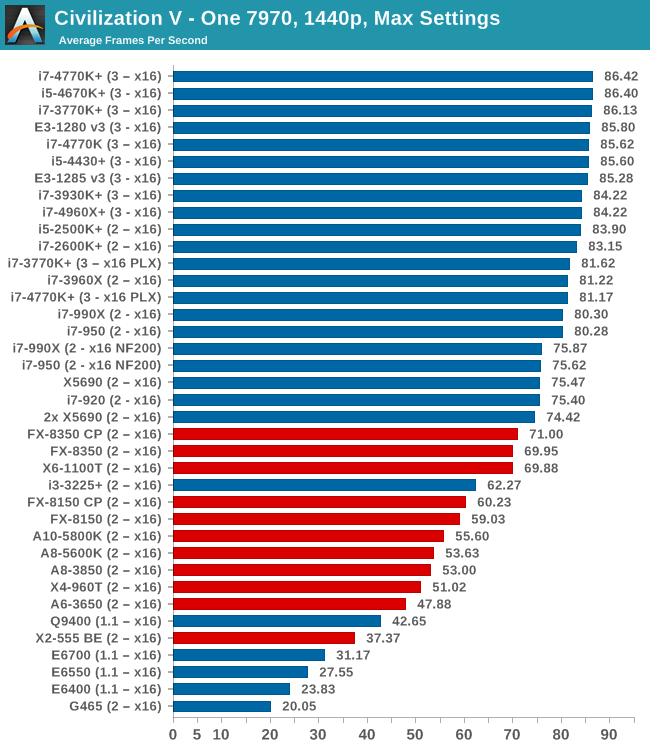
Civ5 seems to love IPC, with our Haswell and Ivy-E CPUs all near the top. All our PCIe 3.0 combinations hit 80 FPS or above.
Two 7970s
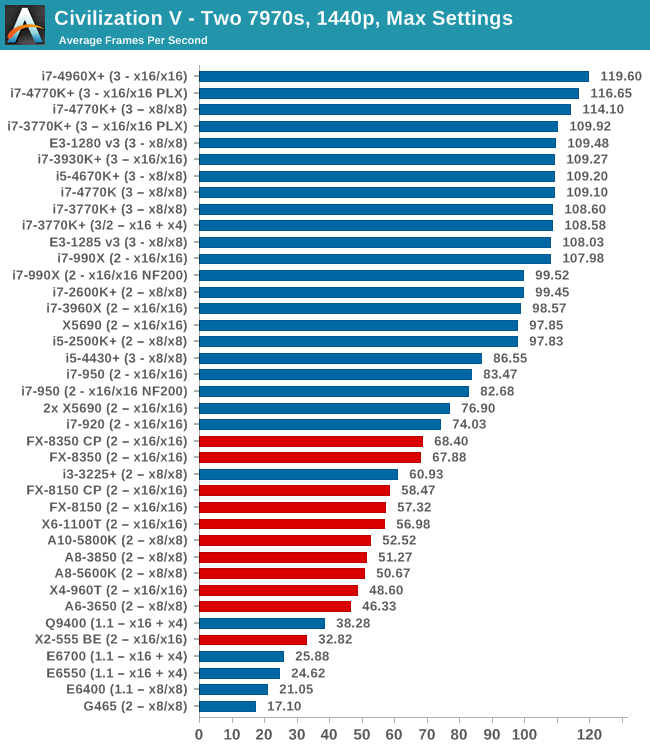
On multiple AMD GPUs the PCIe 3.0 combiantions get the biggest boost, along with anything using a PLX or NF200 chip to boost lane allocations. There seems to be a barrier around 100-108 FPS that only Haswell and Ivy Bridge CPUs are moving over, except the one 990X result. The i7-4960X takes top spot, and the i7-920 is 45 FPS behind - almost 1/3. The i5-4430 is lower than expected, showing little scaling after the first GPU.
Three 7970s
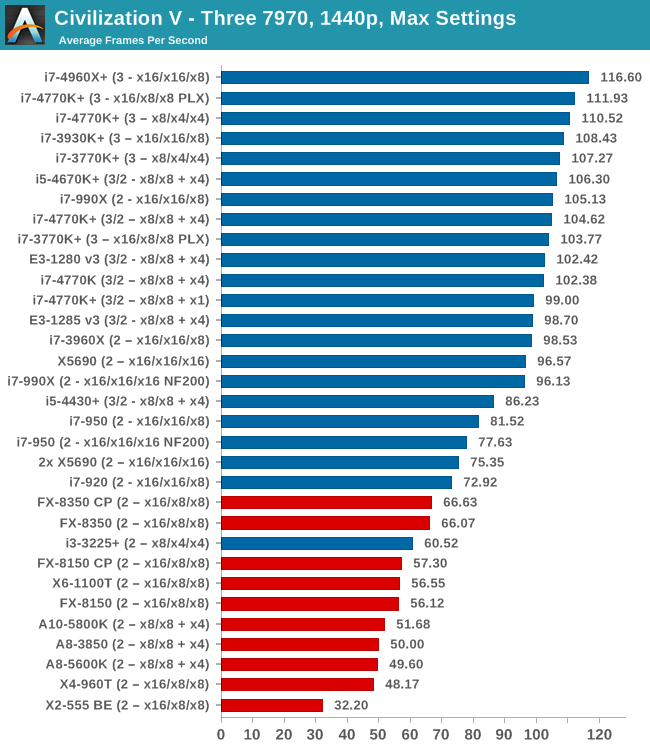
Civ5 has terrible scaling behond one GPU let alone two, meaning most of our tri-GPU results are similar to dual GPU. Again, anything purely PCIe 3.0 seems to get the biggest boost, with the 4670K still fighting alongside the 4770K.
One 580
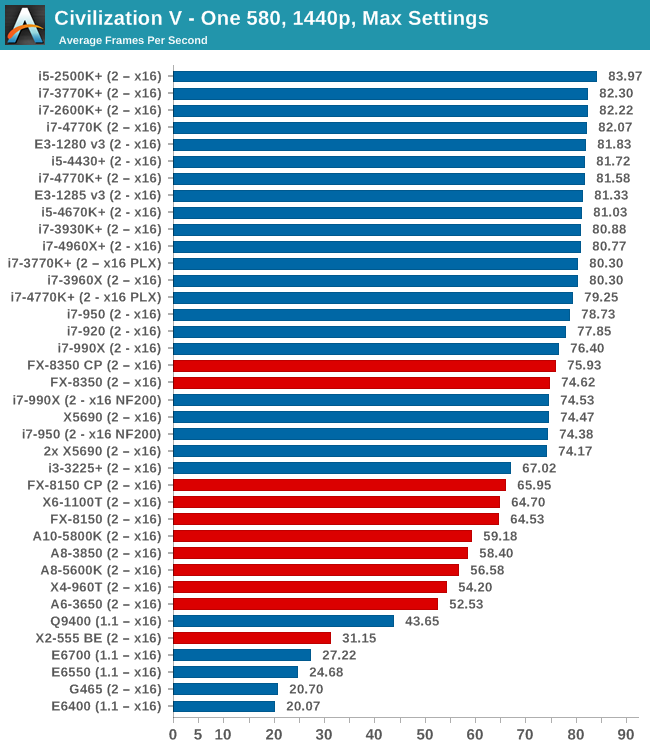
For a single GTX 580 the top spots above 80 FPS are all on the side of Sandy Bridge and above, with Nehalem scoring below this marker. It seems that dual core CPUs take a bashing, suggesting a quad core minimum.
Two 580s
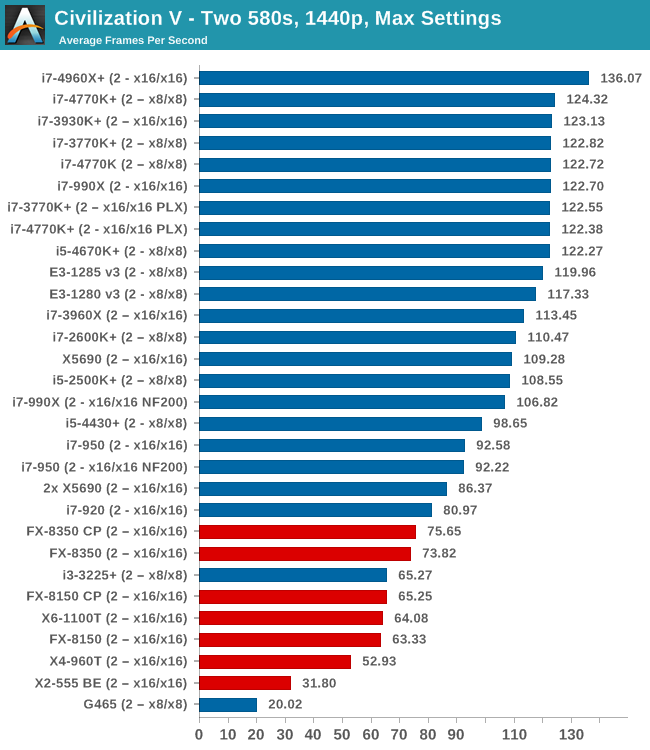
More NVIDIA GPUs for Civ5 means more cores and more lanes where possible, with the i7-4960X taking the top spot. This is almost 40 FPS higher than the i5-4430 and the Nehalem CPUs. The 4670K doesn't miss a beat against the i7-4770K.
Civilization V Conclusion
We see some of our biggest variations in CPU performance in Civilization V, where it is clear that a modern Intel processor (Ivy/Haswell), at least quad core, is needed to get the job done for the higher frame rates. Arguably any high-end AMD processor will perform >60 FPS in our testing here as well, perhaps making the point moot. For single CPU, the i5-4430 performs well in Civ5, though in dual GPU the i5-4670K might be a better investment.










137 Comments
View All Comments
Democrab - Friday, October 4, 2013 - link
It's not really representative of most games, everyone knows it's highly CPU limited...Most games are GPU limited as proven by this, yet a lot of people seem unaware of that.Spoelie - Thursday, October 3, 2013 - link
Another choice I was considering for gaming: the i5 3350p.This is the cheapest i5 available on this side of the pond and still Ivy, so it allows the 4 bin overclocking. Since haswell, intel does not allow any overclocking anymore for non-K parts.
In addition, Z77 motherboards are quite a bit cheaper than Z87 for the moment.
So for a 30$+ cheaper than the 4430, you get 3.7/3.6/3.6/3.5ghz Ivy vs 3.2/3.0ghz Haswell.
The platform isn't that upgradeable but with Intel moving to 2-year cadences for desktop upgrades, the performance should stay relevant for at least 4 years...
mrdude - Thursday, October 3, 2013 - link
Amazing article, Ian. Thanks a ton.It's shocking to see how well the dual core Intel parts and the two-module AMD chips fare, even at 1440p with a single GPU. With respect to single-GPU gaming, opting to pull some $ out of the CPU/MB fund in order to buy a better GPU is certainly more advisable.
Those who invested in the X58/1366 platform certainly got their money's worth. Frankly, even buying a secondhand 1366 platform is a good idea if it's cheaper than a new quad-core 1155/1150 + mobo. Going from an SSD running on 3GB/s to 6GB/s really isn't noticeable. I've done this twice on two separate platforms and the only difference I've seen is with respect to bootup speed.
You also have to figure that this graph will change with the newer generation of console ports. I have an inclining that 2/4 threads might stumble a bit with some more demanding titles. We might even see AVX play a more significant role as well
cbrownx88 - Thursday, October 3, 2013 - link
BF4 is gonna bump me from X58 I believe... way more CPU bound than BF3 (1920x1200@4.2ghz)snouter - Wednesday, October 30, 2013 - link
BF4 makes my 4930k work more than I thought it would.BOMBOVA - Friday, October 4, 2013 - link
i am reviving my x58 MSI board, with Syba sata 3 controller, and i really notice a difference on my long video editing files. that was my whole point of modding up. Cheers. good discussionchizow - Thursday, October 3, 2013 - link
I really appreciated what this article tried to accomplish, and I think it does shed some light on some aspects of what you were trying to test...but someone at AnandTech couldn't throw you a bone and get you a pair of higher-end GPUs to test? 580s are a bit long in the tooth to garner any meaningful results. Maybe Gigabyte could have kicked a pair of 680s to you?Also, it would have been nice to see some Battlefield 3 results, since it is widely touted as a title that scales extremely well with both CPU (and shows big differences with HT) and GPU, especially in MultiPlayer, and will be especially relevant in the next few months as Battlefield 4 launches.
dusk007 - Thursday, October 3, 2013 - link
I find testing for CPU performance is not a strong suit of reviewers. The test has lots of data but it is missing the situations that gamers end up in which do require CPU performance.Starcraft 2. Just run a replay of an 8 player map at 4x-8x speed and most dual core notebooks practically break down.
Total War set unit size to epic and run some huge battle. That is where this games is great but it drains cpu resources like crazy.
Shooters or racing games are examples where the CPU has to do nothing but feed the GPU which is really the least CPU intensive stuff. Mulitplayer adds quite a bit of overhead but it is still not something if you play you need to worry much about your CPU.
When testing CPU performance kick all those shooters to the curve and focus on RTS games with huge unit sizes.
It is the minimum frames at these games that require CPU performance. The situations where it gets annoying that in the biggest battles the CPU cannot keep up. Starcraft 2 on medium runs on almost any GPU but it can bring slower CPU quickly to its limits.
IanCutress - Thursday, October 3, 2013 - link
COH2 is planned for our next benchmark update to cover the RTS side. I know Rome II is also a possibility, assuming we can get a good benchmark together. As I mentioned, if possible I'd like to batch file it up so I can work on other things rather than moderate a 5 minute benchmark (x4 for repetitions for a single number, x4-8 for GPU configs to complete a CPU analysis, x25+ CPUs for scope).If you have any other suggestions for the 2014 update, please let me know - email address is in the article (or click on my name at the top).
Ian
anubis44 - Saturday, October 5, 2013 - link
"COH2 is planned for our next benchmark update to cover the RTS side."Excellent. This is one of my most-played games. In addition, I wouldn't be surprised if subsequent patches for this game didn't noticeably improve it's multi-threaded performance, so having older results will be nice to have once these patches are released in order to track the improvements.